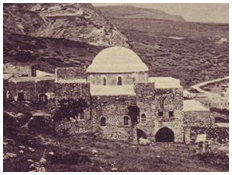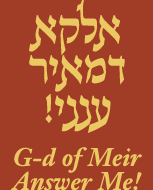 RABBI MEIR BAAL HANEIS (Rabbi Meir, Master of Miracles) was a great sage who lived in the Mishnaic era. The name "Meir" is actually a sobriquet — his real name is thought to have been Nahori or Misha. The name Meir, meaning "Illuminator" in Hebrew, was given to him because he “enlightened” the eyes of scholars in Torah study and to know the light of G-d. The epithet ‘Baal Haneis’ means "the master of miracles” which was added due to the wondrous miracles that G-d performs in his merit. RABBI MEIR BAAL HANEIS (Rabbi Meir, Master of Miracles) was a great sage who lived in the Mishnaic era. The name "Meir" is actually a sobriquet — his real name is thought to have been Nahori or Misha. The name Meir, meaning "Illuminator" in Hebrew, was given to him because he “enlightened” the eyes of scholars in Torah study and to know the light of G-d. The epithet ‘Baal Haneis’ means "the master of miracles” which was added due to the wondrous miracles that G-d performs in his merit.
At the end of 66 CE, there was a Jewish revolt in Judea stemming from Greek and Jewish religious tension. According to the Talmud, Nero Claudius Caesar (37-68 CE) fifth and last Roman Emperor of the Julio-Claudian dynasty, wanted to lead his army into battle against Jerusalem. He wished to determine if he would be successful in destroying her. He therefore shot arrows in all four directions. Miraculously they all fell towards Jerusalem. He took this as a heavenly sign that he would be victorious. He then asked a passing child to repeat the Scriptural verse he had learned that day. The child quoted a verse in Ezekiel 25-14 "I will take revenge of Edom, through the Jewish people". Nero became terrified. He said to himself, "G-d wants me to destroy His House and later avenge Himself in me!" Nero decided to flee to Rome and convert to Judaism to avoid Divine retribution. Vespasian was then dispatched in his stead to put down the rebellion. Jewish tradition reports that Rabbi Meir was a descendant of Emperor Nero.
Rabbi Meir studied under Rabbi Yishmael and then under Rabbi Akiva. He also studied under the famed scholar Elisha ben Avuya, who after adopting a worldview considered heretical by his fellow Tannaim, the rabbis of the Talmud refrained from relating teachings in his name and referred to him as Acher, the "Other One". Rabbi Meir continued studying under him while at the same time used their relationship to implore him incessantly to repent his ways and return to the fold. When Elisha was on his deathbed Rabbi Meir was there and one last time begged him to repent. Elisha asked "After all I have done, will I still be accepted? Rabbi Meir said: Is it not written: You return a person to dust (Psalm 90:3) which means, even to the point that a life is ground to the dust one can return. Elisha ben Abuya cried and died. Rabbi Meir rejoiced and said "It seems to me that my teacher departed in a moment of repentance". When they buried him, a fierce fire came and began to burn his grave. They came and told Rabbi Meir: Your teacher's grave is burning. Rabbi Meir went out and spread his Tallis over Elisha's grave and prayed. The fire died down. When later generations questioned how it was permitted for Rabbi Meir to continue studying under Elisha even after he had soured, the response was given that Rabbi Meir was very great and he was able to take only the good and reject the bad.
Rabbi Meir became one of the greatest of the Tannaim. There are three hundred and thirty five laws in the Mishnah that are explicit quotes in the name of Rabbi Meir. In addition there is a rule in the Talmud that all anonymously authored opinions in the Mishnah are attributed to Rabbi Meir. One of the sages of the Talmud, Rav Acha Bar Chanina said âThere is no question that Rabbi Meir was the greatest scholar of his generation. Nevertheless, the final Halacha is not necessarily established according to his opinion because he was so brilliant, the greatest sages of his generation could not plumb the depth of his great genius and wisdom."
Rabbi Meir was married to Beruriah, one of the few women cited in the Talmud and famous for her great brilliance and wisdom. She was the daughter of Rabbi Chananiah ben Teradyon, one of the ten Jewish leaders martyred by the Roman Government. The Roman Government ordered that Rabbi Chanina and his wife be executed for teaching Torah publicly. They also decreed that their younger daughter (Beruriah's sister) be placed in a brothel. Beruriah asked Rabbi Meir to save her sister. Rabbi Meir took a bag of gold coins and went to the brothel disguised as a Roman horseman. He offered the money as a bribe to the guard. The guard replied, "When my supervisor comes, he will notice the prisoner missing and kill me." Rabbi Meir replied that when you are in danger - say the words, "God of Meir - answer me" and you will be saved." The guard wondered, "How can I be guaranteed that this will save me?" Rabbi Meir replied, "Look! There are man-eating dogs over there. I will go over to them and you will see for yourself." Rabbi Meir walked towards the dogs. They ran over to tear him apart. He cried out "God of Meir - answer me!", and the dogs retreated. The guard was thus convinced and handed over the girl to Rabbi Meir. When the brothel prison supervisors came, the guard bribed them with the money. Eventually, the money was exhausted, and the guard's deed was publicized. The government arrested the guard and sentenced him to death by hanging. When they tied the rope around his neck he cried out "God of Meir - answer me!" The rope tore and the guard escaped.
Rabbi Meir suffered great personal tragedy. He had two sons and a daughter. When his two dear sons suddenly passed away on the Sabbath, his wife Beruriah covered them and hid the news from him so as not to sadden him on this holy day. After the Sabbath she asked him, "What if someone gave me a great treasure to hold for him and he now demands that I return it, must I give it back?" "Of course" he replied, not realizing what she was leading up to. She took his hand and led him into the room where the two dead children lay. When she removed the cover and he realized the great tragedy, he began to cry. She confronted him "Didn't you just say that we must return the treasure to its owner? G-d gave them to us and now G-d took them back. May His name be blessed". In fact, you my dear husband taught that "one is required to bless G-d for the bad just like for the good." (Talmud, Berachot 48).
Rabbi Meir Baal Haneis passed away on the 14th day of the Hebrew month of Iyar. He is buried on the shores of Lake Kinneret, only a short distance from the city of Tiberius. The grave of Rabbi Meir Baal Haneis is one of the holiest sites in the Jewish world and thousands of people flock there to pray for their salvation.
Before his death, Rabbi Meir Baal Haneis promised - as his legacy to all generations - that he will personally intercede in Heaven, on behalf of anyone in distress, who will give charity to the poor in Israel in his memory.
To this very day it has been a sacred and hallowed tradition for Jews, in crisis or need, to recite the words “God of Meir - answer me!” while giving Tzedakah to the RABBI MEIR BAAL SALANT charity, established in 1860 by the Chief Rabbi of Jerusalem, Rabbi Shmuel Salant and his father-in-law Rabbi Yosef Zundel salant. Countless stories abound of men and women who during a personal crisis, experienced miraculous help when they gave charity to this holy fund in memory of Rabbi Meir Baal Haneis. |




 History
History Programs
Programs Endorsements
Endorsements Donate Now
Donate Now Prayers
Prayers Contact Us
Contact Us